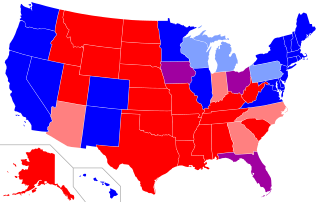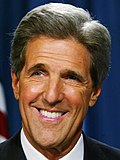
The States' Rights Democratic Party was a short-lived segregationist political party in the United States, active primarily in the South. It arose due to a Southern regional split in opposition to the national Democratic Party. After President Harry S. Truman, the leader of the Democratic Party, ordered integration of the military in 1948 and other actions to address civil rights of African Americans, including the first presidential proposal for comprehensive civil and voting rights, many Southern white politicians who objected to this course organized themselves as a breakaway faction. They wished to protect the ability of states to maintain racial segregation. Its members were referred to as "Dixiecrats", a portmanteau of "Dixie", referring to the Southern United States, and "Democrat".

From January 14 to June 8, 2004, voters of the Democratic Party chose its nominee for president in the 2004 United States presidential election.

Super Tuesday is the United States presidential primary election day in February or March when the greatest number of U.S. states hold primary elections and caucuses. Approximately one-third of all delegates to the presidential nominating conventions can be won on Super Tuesday, more than on any other day. The results on Super Tuesday are therefore a strong indicator of the likely eventual presidential nominee of each political party.
Democrats Abroad is the official organization of the Democratic Party for United States citizens living temporarily or permanently abroad. The organization is given state-level recognition by the Democratic National Committee.

Starting with the 2000 United States presidential election, the terms "red state" and "blue state" have referred to U.S. states whose voters vote predominantly for one party — the Republican Party in red states and the Democratic Party in blue states — in presidential and other statewide elections. By contrast, states where the vote fluctuates between the Democratic and Republican candidates are known as "swing states" or "purple states". Examining patterns within states reveals that the reversal of the two parties' geographic bases has happened at the state level, but it is more complicated locally, with urban-rural divides associated with many of the largest changes.

The 2004 United States presidential election in New Jersey took place on November 2, 2004, and was part of the 2004 United States presidential election. Voters chose 15 representatives, or electors to the Electoral College, who voted for president and vice president.
The 1856 Democratic National Convention was a presidential nominating convention that met from June 2 to June 6 in Cincinnati, Ohio. It was held to nominate the Democratic Party's candidates for president and vice president in the 1856 election. The convention selected former Secretary of State James Buchanan of Pennsylvania for president and former Representative John C. Breckinridge of Kentucky for vice president.

The Draft Mark Warner for President committee was an effort to promote the candidacy of former Governor of Virginia Mark Warner. It was founded the day after the 2004 presidential election by Democratic Party activist Eddie Ratliff of Virginia. On October 23, 2007, the Draft Warner for President Committee received a letter from the Federal Elections Commission (FEC) in response to the committee's declaration of intent to cease operations, dated October 2, 2007, and was allowed to terminate its affairs and cease filing with the FEC. Warner had announced his intent to become a Senate candidate prior to the committee's letter to the FEC.

The 2008 Democrats Abroad presidential primary took place from February 5, 2008 until February 12.

Statewide public opinion polls that were conducted relating to the 2008 United States presidential election are as follows.

Elections in Wisconsin are held to fill various local, state, and federal seats. Special elections may be held to fill vacancies at other points in time.

The 1932 United States presidential election in California took place on November 8, 1932 as part of the 1932 United States presidential election. State voters chose 22 representatives, or electors, to the Electoral College, who voted for president and vice president.

From January 3 to June 5, 2012, voters of the Democratic Party chose its nominee for president in the 2012 United States presidential election. President Barack Obama won the Democratic Party nomination by securing more than the required 2,383 delegates on April 3, 2012, after a series of primary elections and caucuses. He was formally nominated by the 2012 Democratic National Convention on September 5, 2012, in Charlotte, North Carolina.
This article includes the entire 2016 Democratic Party presidential primary schedule in a format that includes result tabulation. Below are the vote totals for everyone that appeared on the ballot during the 2016 Democratic presidential primaries. Two candidates, Bernie Sanders and Hillary Clinton, appeared on all 57 ballots. Two others, Martin O'Malley and Rocky De La Fuente, appeared in over 30 states and six others appeared on between two and ten states. Nearly 20 appeared on only New Hampshire's ballot. As of June 8, Hillary Clinton was considered the presumptive nominee according to media organizations. On July 26, the second day of the Democratic National Convention, Clinton was confirmed the Democratic nominee for the 2016 United States presidential election.

The 2016 Democrats Abroad presidential primary took place on March 1–8, 2016. E-mail, fax, and postal voting were carried out from January 11 to March 8, while in-person voting took place from March 1–8. Results were released on March 21.

The 2012 Democrats Abroad presidential primary took place on May 1-6, 2012.
Democrats Abroad holds a primary awarding delegates to the Democratic National Convention to represent expatriate voters. This primary is conducted as part of the Democratic Party's presidential primaries. In some earlier elections, in place of a primary, a caucus system was used by Democrats Abroad to determine their convention delegations.

The 1948 United States presidential election in South Carolina took place on November 2, 1948, as part of the 1948 United States presidential election. State voters chose eight electors to the Electoral College, which selected the president and vice president.

The 2020 United States presidential election in Virginia was held on Tuesday, November 3, 2020, as part of the 2020 United States presidential election in which all 50 states plus the District of Columbia participated. Virginia voters chose electors to represent them in the Electoral College via a popular vote, pitting the Republican Party's nominee, incumbent President Donald Trump, and running mate Vice President Mike Pence against Democratic Party nominee, former Vice President Joe Biden, and his running mate California Senator Kamala Harris. Virginia has 13 electoral votes in the Electoral College.

The 2020 Democrats Abroad Presidential Primary took place from March 3 to 10, 2020, allowing U.S. citizens residing outside the United States and those officially affiliated with Democrats Abroad to participate in the Democratic Party's 2020 presidential nomination process. Spanning more than 230 voting locations worldwide, participants cast their in-person votes across various countries and continents. Alternative voting methods included e-mail and postal mail. The voting period started on Super Tuesday and concluded the Tuesday of the following week. The 2020 Democrats Abroad Global Primary allocated a total of 21 delegates to the 2020 Democratic National Convention. Among these, 13 were pledged delegates, committed to supporting a specific candidate based on primary results, each holding a full vote. Additionally, 8 automatic delegates, unbound to any candidate and each possessing a half vote, contributed to a cumulative total of 17 votes.



















